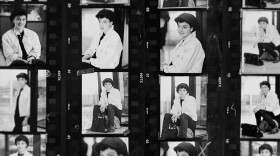“Marisol”

In the film "Marisol" directed by Kevin Abrams and written by Claire Audrey Aguayo, Marisol Rivera, a high school student with college aspirations, makes a fateful decision to attend a party the night before her admission interview. This decision sets off a series of events that reveal a secret about Marisol: she is undocumented and unaware of it.
The film then takes on a horror-like quality, reminiscent of anxiety-inducing films like "It Follows". However, in this case, the source of the unseen aggressor constantly moving toward our main character is systemic-racism and xenophobia, embodied by a troubled teenager radicalized by white nationalism on the internet and the unchecked power of ICE as an organization.
Esmeralda Camaro delivers an understated yet devastating performance as Marisol. The movie is shot on film, with elegant landscapes and color grading that give it a timeless quality. The camera work and overall style feel modern while fitting in with the golden age of independent cinema in the 1990s.
Overall, "Marisol" is a powerful, beautiful, and human film that packs a punch and I absolutely recommend it.
Marisol is available on video on demand on September 12th.
“TraumaZone: Russia 1985-1999”

Legendary BBC documentarian Adam Curtis delivers another sprawling examination on alienation in the 7-part series "TraumaZone: Russia 1985-1999". The series covers Russia during the collapse of the Soviet Union and Russian-style communism, as well as the failure of democracy and a shift toward a western-style capitalism. According to the film, these crises left behind a country full of deep wounds and a prevailing attitude, which one woman in the film elegantly distills down to one of the most memorable moments in the more than 7 hours of accumulated runtime: "I don't have any dreams, and even if I did, they wouldn't come true. I don't believe in anything or anyone."
The film is built from footage from the storied archives at the BBC, resulting in footage from all over Russia over the decades, telling a sprawling story of a country in a tailspin and the suffering that it caused the people who lived there. Although Curtis' voice is missing from the film, he explained in an interview that the footage "speaks for itself," and he wanted to let it breathe.
And to his point, the images are incredible, the assembly is masterful, and the score is perfectly put together, as usual. There is a lot more that can be said about this series, but it's best to experience it firsthand.
"TraumaZone" is now available from the BBC.
”How To with John Wilson”

The season 3 finale of one of my all-time favorite TV shows, HBO's How To with John Wilson, aired last Friday, also serving as the series finale.
Although I don't typically talk about TV shows here, I have to say that I agree with John Wilson's statement in multiple interviews that each episode of the series is like its own short film.
It's difficult to explain, but each episode is meant to be a how-to video that gets derailed and goes to unexpected, often profound places, exploring sometimes very dark, very human, and incredibly funny moments.
For example, the episode "How to Appreciate Wine" eventually leads the narrator to spend time with someone passionate about collecting military rations, telling a stranger than fiction story about his experience with the NXIAM cult when he was in an a-cappella group and having an unlikely encounter with the enigmatic, possibly dubious CEO of an energy drink company.
Wilson narrates the series, delivering a stuttering, undeniably idiosyncratic performance that becomes a charming and comforting presence. “How To” is anchored in the vast archives of footage that Wilson has amassed over the years, and his eye for the absurdity and humor of everyday life, specifically his life in New York.
The past three seasons have been some of my favorite non-fiction cinema in recent memory. They're experimental documentaries in the sense of any film I've seen at True / False and from places like Harvard's Sensory Ethnography Lab. The blend of Wilson's passion for documentary and his deadpan sense of humor creates an ephemeral feeling, as if you're witnessing something special, a true cinematic voice in the superhero and reality TV void of the streaming giants.
I will deeply miss How To with John Wilson, but I'm just thankful that we had it at all.
How to with John Wilson is available in its entirety on Max.

















